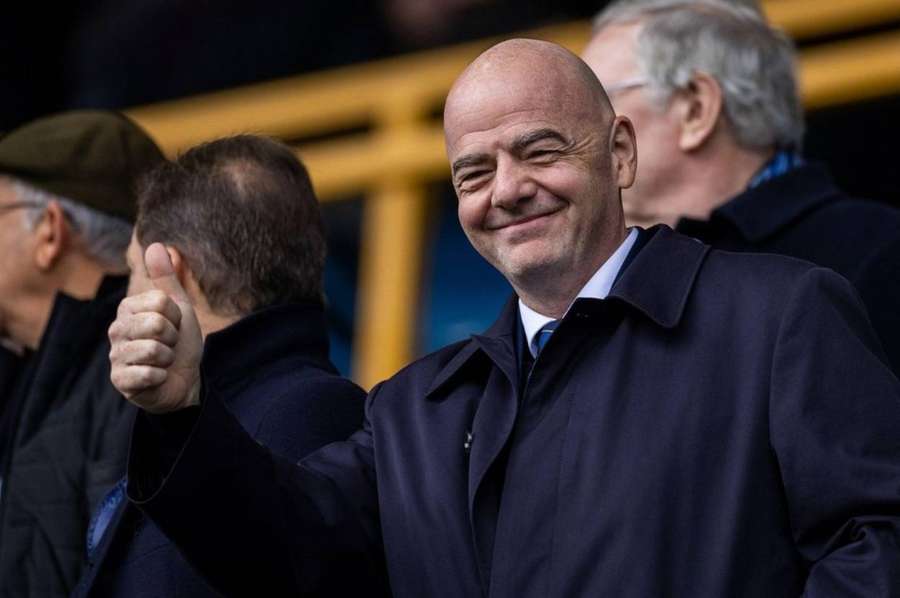Gianni Infantino set for unopposed third term as FIFA president

Delegates from the 211 member federations will have a limited choice at the 73rd FIFA Congress, between re-electing the 52-year-old incumbent by acclamation or symbolically disapproving.
Unexpectedly elected in February 2016 following the scandal that brought down Sepp Blatter, Infantino already stood unopposed for re-election in 2019 and is now poised to stay in charge of world football until at least 2027.
While the statutes of the Zurich-based organisation currently limit a president to a maximum of three four-year terms, Infantino has already prepared the ground to stay until 2031, declaring in December that his first three years at the helm did not count as a full term.
The Swiss-Italian lawyer, born less than 10 kilometres away from Blatter's home village, has nevertheless never been far away from controversy as president of FIFA, as he has moved to expand the men's World Cup and the Club World Cup during his time at the helm.
He staunchly defended Qatar, host of the recent men's World Cup whose treatment of migrant workers, women and the LGBTQ community came under the spotlight.
Infantino accused Western critics of the decision to award the tournament to the Gulf state of "hypocrisy" and "double standards".
It will not all be plain sailing for Infantino in Kigali, with the Norwegian Football Federation tabling a proposal to discuss "FIFA's responsibilities to remedy human rights abuses" in relation to the Qatar World Cup and future tournaments.
Expansion plans
However, European opponents to Infantino were not able to put forward a candidate to stand against the president who has already overseen the expansion of the men's World Cup from 32 teams to 48 in time for the 2026 edition in North America.
That is set to lead to a significant increase in the number of matches played, just as the upcoming Women's World Cup in Australia and New Zealand will feature 32 teams, up from 24 at the last edition.
Infantino has delivered on promises to make those tournaments bigger and is now eager to push through another of his pet projects, the expanded Club World Cup.
"The new competition will take place in 2025 and will feature 32 teams, making it really like a World Cup," he said in Doha in December.
The last four years have seen FIFA undertake major reforms of the football transfer system, including introducing a licence for agents and a cap on agents' commissions.
Moves were made to bring in mandatory maternity leave for pregnant footballers and the rules on disciplinary proceedings for cases of sexual assault have been toughened.
Infantino can also point to healthy financial results, with FIFA revenues increasing 18 percent in the last four-year cycle and reserves up 45 percent.
Money machine
Those improved financial results allow FIFA to keep on increasing the amount of money it provides in subsidies to federations, in turn helping ensure many of them will continue to back Infantino.
And a 48-team World Cup will lead to even greater revenues, with FIFA announcing in December projected income of $11 billion up to 2026, compared to $7.5 billion in the cycle ending in 2022.
In order to make football "truly global", as Infantino says, at a time when leading European clubs are able to hoard talent and wealth, FIFA distributes money evenly.
And so the likes of Trinidad and Tobago and Papua New Guinea receive the same amounts as Brazil, and each has one vote at the congress.
As long as the FIFA president keeps on his side the 35 Central American nations, including numerous Caribbean islands, or the 54 African federations, he need not worry about upsetting the powerful European nations.
That is why the failed plans for a biennial World Cup, or the decision to ban rainbow-themed "One Love" armbands promoting LGBTQ rights at the tournament in Qatar, do not matter as Infantino eyes a new term.
Yet the fractures in football show no sign of healing as long as Infantino's expansion plans continue.
For example the World Leagues Forum, bringing together 44 leagues worldwide, has complained that FIFA did not consult with them before announcing plans for the new Club World Cup, which will be shoehorned into an "already overloaded" calendar.

